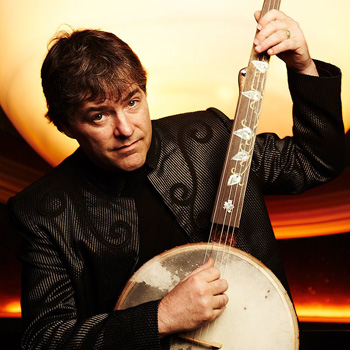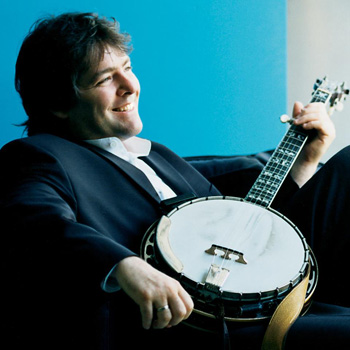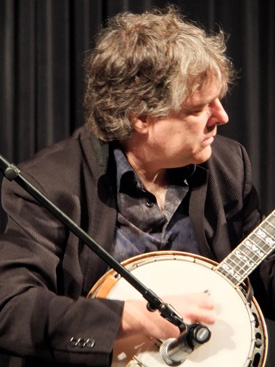"In the case of these solo concerts, the audience will be my collaborators. They will become the catalyst that will make the concerts work - I hope!” Bela Fleck
MIM to Host Banjoist Bela Fleck’s 1st Stand Alone Solo Show

By Mariah Fleming
You may think you don’t know the music of banjoist Bela Fleck, but chances are very good that you’ve heard him. He has won 15 Grammy awards and been nominated in more music categories than anyone in Grammy history. And Fleck will be in rare form when he appears in his first stand alone solo performance at the Musical Instrument Museum in Phoenix on Wednesday May 15th. He’ll perform two shows at 7PM and 9PM. Tickets are going fast, but good seats are still available at theMIM.org. That Fleck is doing the first of these shows at the MIM music theatre is reason enough not to miss this show. But it’s certainly not the only reason.
Since the death of his longtime friend, Earl Scruggs, Bela Fleck is inarguably regarded as the world’s most popular and well-respected banjoist. Fleck has singlehandedly redefined the concept of banjo music with one groundbreaking project after another. Ever since Bela Fleck and the Flecktones hit the stage 25 years ago, literally everything he’s done musically has been groundbreaking. We last saw Fleck in November 2012 during the Arizona leg of his tour with formidable jazzmen the Marcus Roberts Trio. The performance was spellbinding. Roberts has said about Fleck: “It’s not often that you run into somebody who’s really interested in digging deep into the essence of something to explore it.” And that may be one of the best descriptions of what makes Fleck’s music a bit of gold dust.
Fleck is known for delivering superlative performances infused with humility and wit. His current projects include performing in a duo with Chick Corea, who is one of his earliest musical influences. Fleck also performs in a trio with Zakir Hussein and Edgar Meyer, in duos with banjoist Abigail Washburn and with African artists such as Oumou Sangare and Toumani Diabate. Fleck has a deep interest in indigenous music. In 2008 he traveled to Africa with his brother, filmmaker Sascha Paladino, to make the award-winning documentary “Throw Down Your Heart.” This exquisite film takes Fleck on a journey to Africa to trace the origins of the banjo, long wrongly identified as indigenous to the American South.
Watching Fleck’s music evolve since first hearing him with New Grass Revival has been nothing short of spectacular. The interview that follows is a glimpse into the remarkable musical life of Bela Fleck.
Q. In addition to winning numerous Grammy awards, you’ve been nominated 30 times in more music categories than anyone in the history of the Grammy awards. What can people expect to hear from you at your MIM show?
A. This will be my first stand alone solo show, the first of 5 shows. It will be a very intimate evening with me and my banjo. I'll showcase a lot of what I love about the banjo, from Bluegrass to African music to Classical, and many of my own compositions, with a healthy improvised element. I might even speak to the audience, but only in Swahili.
 Q.The way you play banjo has always struck me as very percussive. Particularly in your recent concerts with the Marcus Roberts Trio, the polyrhythms in the compositions were spellbinding. Do you consider the banjo to be a percussion instrument?
Q.The way you play banjo has always struck me as very percussive. Particularly in your recent concerts with the Marcus Roberts Trio, the polyrhythms in the compositions were spellbinding. Do you consider the banjo to be a percussion instrument?
A. I love the percussive aspects of the banjo's nature, and when playing in groups, I lean on that side extensively. Playing solo I hope to explore the melodic and rhapsodic sides as well as digging into the different and sometimes unexpected moods it can create.
Q. I've read that you don't read or write music well. If that's true, it's astounding. What is the process you use to write your songs? For example, when you composed your "Concerto for Banjo and Orchestra" for a 60-piece ensemble, how did you let the other musicians know what to play?
A. I do have a great relationship with banjo tablature - a number system that was developed for the lute several hundred years back. And now with modern software, I can change that into standard musical notation, which classical musicians can read. That's how I managed to pull off the concerto. I did write every note, and orchestrated it as well, all by using tablature to input the notes.
Q. The Flecktones continue to have a strong and enthusiastic following over the last 25 years. You financed the first Flecktones CD yourself. Did you know then that you had something extraordinary on your hands?
A. I felt that it was a worthy bet! I was trying to avoid going to the only record labels I had a relationship with - the bluegrass labels. I didn't feel like this was the right home for the Flecktones, and if I took their money to record the record, I'd have to give it to them. So I bet my own money. I did the same thing with my African project, Throw Down Your Heart, which had a documentary and two CD's. I am also glad I did that one.
Q. There seems to be a special relationship or bond with your musical collaborators that translates to the audience in concert. It's as if your projects are touched by serendipity. How do you choose the people you work with…or do they 'choose' you?
A. We all find each other in a myriad of ways. No two are the same. The Flecktones just all arrived in my life when I needed them. In Bluegrass, I clawed my way into the inner circle! In the case of these solo concerts, the audience will be my collaborators. They will become the catalyst that will make the concerts work - I hope!
Q.At your concerts, you always invite people to talk to you after the show. I've seen parents bring their kids up to talk to you. It must be gratifying, but also tiring at the end of a show to engage with the audience one to one. What continues to inspire you to talk with your fans?
A. Sometimes it helps me to remember not to be so hard on myself. After a show, sometimes I am frustrated by how I played, the sound, or whatever. Talking to people reminds me that everyone is having a different experience and that it's not even about that one show.
Q. Your wife Abigail Washburn is known for her all female roots band Uncle Earl, and the Sparrow Quartet, her project with you. The Boston Globe declared Abigail 'a modern classic.' How did you and Abigail meet?
A. We met in Nashville at a square dance. She is very special both as a person and as a musical/artistic force.
Q. You're quoted as saying that when you heard Flatt and Scruggs music on The Beverly Hillbillies, "it was like sparks going off in my head." Your playing was influenced early on by Earl Scruggs' banjo style. When did you first meet Earl Scruggs and what is your most vivid memory of that occasion?
A. I first met Earl thru John Hartford, who introduced us and got us to play together for the first time. John was a wonderful friend. We all miss him in the acoustic community.
Q. Over the years, did you and Earl Scruggs talk about the new ways in which you were transforming the concept of the banjo, and was he supportive of your efforts?
A. He was very supportive, and in fact he came to the premiere of my banjo concerto 6 months before he passed away at 88 years old. He lived a mile from me, and I saw him often when I came home from touring.
Q. Your first album with Jack Tottle's "Tasty Licks" was not long after high school, then you worked with Sam Bush and Jerry Douglas on your first solo album for Rounder at 19, and joined New Grass Revival in 1981. Your grandfather gave you your first banjo in 1973. Did he get to witness your success?
A. Unfortunately, he only saw me enthused and excited and playing in small bands. I wish he and my grandmother could have seen some of this. Maybe they have!
Q. In 2009 you did the award-winning documentary 'Throw Down Your Heart' with your brother, documentary filmmaker Sascha Paladino. You traveled to Uganda, Tanzania, Gambia and Mali to collaborate with African musicians. How long were you in Africa filming?
A. About 5 weeks, all together.
Q. From the film comes your 2009 CD "Throw Down Your Heart, Tales from the Acoustic Planet, Africa Sessions." Are you continuing to work with some of the musicians you met in the course of the filming?
 A. I toured last summer with Oumou Sangare, the Malian songbird, and before that I did quite a bit of duo concertizing with Toumani Diabate. I am hoping to continue these friendships and musical partnerships.
A. I toured last summer with Oumou Sangare, the Malian songbird, and before that I did quite a bit of duo concertizing with Toumani Diabate. I am hoping to continue these friendships and musical partnerships.
Q. You were searching out the roots of the banjo, which is an African instrument. In Gambia you saw a three stringed instrument called the "Akonting" that may be the original banjo. How did you feel when you were told that the Akonting was the instrument that historically was used to help Africans gain strength for the journey to slavery, from which they knew they would never return?
A. That certainly gave me pause. It makes sense, but it was a wild thing to hear. We were told that it saved a lot of slaves from total despair.
Q. Music has been called "the international language" yet the world seems to be losing its musical roots. It's not being handed down like it once was. Do you think the medium is decomposing?
A. I think you could draw whatever conclusion you want and then find supporting evidence. I see remarkable music happening at the same time that funding for public music programs is dwindling. Music is not going away, it might have to fight its way thru sometimes, like grass growing around cement in New York City!
Q. What draws you to indigenous music? Do you have any plans for more documentaries or recordings of other kinds of indigenous music?
A. I don't know, but just like hearing Earl Scruggs for the first time - there is music that makes me stop in my tracks, and become very curious. At the moment I am finishing up a documentary about the banjo concerto I premiered last year.
Q. The Library of Congress is doing major research into all kinds of music projects relating to endangered music. Do you have any plans to work with the Library of Congress?
A. Not so far. I am not an ethnomusicologist. I want to be playing and interacting, not documenting.
Q.The MIM has a tremendous collection of contemporary and historic instruments from all over the world, and all genres of music. Which instruments that you've used in your career might be good candidates for the MIM?
A. All of them!
Next Week A “Behind the Scenes” interview with Bela Fleck’s longtime Audio Engineer and Tour Manager, Richard Battaglia
Contact the author of this article at Editor@MusicAndMoreAZ.com.